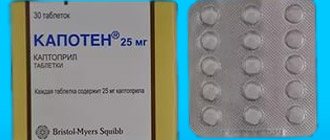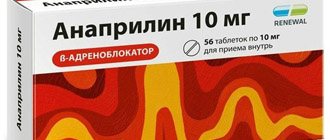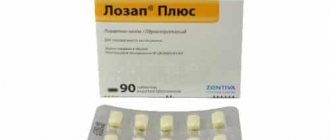Side effects
From the cardiovascular system and blood (hematopoiesis, hemostasis): orthostatic hypotension, tachycardia, peripheral edema.
From the respiratory system: dry cough, bronchospasm, pulmonary edema.
Idiosyncrasy: angioedema of the extremities, face, lips, mucous membranes, tongue, pharynx or larynx is observed when using ACE inhibitors, incl. and captopril.
From the side of water and electrolyte balance: hyperkalemia (most likely in renal failure), hyponatremia (most often with a salt-free diet and simultaneous use of diuretics), proteinuria, increased levels of urea nitrogen in the blood and creatinine, acidosis.
From the hematopoietic system: in rare cases, neutropenia, agranulocytosis, thrombocytopenia and anemia. In patients with normal renal function (creatinine clearance <1.6 mg/dL) in the absence of other complicating factors, neutropenia was observed in 0.02% of cases. Rarely, a positive test for antibodies to nuclear antigen.
From the gastrointestinal tract: taste disturbance (reversible, goes away on its own), dry mouth, aphthous stomatitis, increased activity of liver enzymes, rarely - abdominal pain, diarrhea, gingival hyperplasia, hepatitis, increased levels of hepatic transaminases in the blood plasma and hyperbilirubinemia.
From the skin: rash (mild, maculopapular, disappearing within a few days after reducing the dose), usually accompanied by itching and, in rare cases, increased body temperature; flushing of the face, vesicular and bullous rashes, erythema (including Stevens-Johnson syndrome) and photosensitivity.
From the nervous system and sensory organs: headache, dizziness, ataxia, paresthesia, drowsiness, visual impairment.
Adverse reactions
The instructions mention possible negative manifestations in response to treatment with Capoten. Patients may experience:
- anorexia, increased potassium levels;
- decrease in eosinophils, platelets, agranulocytes;
- uniformly or periodically changing accelerated heartbeat, decreased blood pressure;
- hot flashes, pale skin, swelling of peripheral areas;
- dry nonproductive cough, shortness of breath, bronchospasm, swelling of the lung tissue;
- attacks of dizziness, cephalalgia, drowsiness, circulatory disorders, problems with skin sensitivity;
- decreased visual acuity, increased dryness of the oral mucosa;
- dyspeptic disorders, stomatitis, glossitis, gastrointestinal ulcerations, discomfort in the abdominal area;
- liver dysfunction, hepatitis, jaundice, cholestasis;
- obsessive itching, dermatological rash, focal baldness, urticaria;
- swelling of the face, arms and legs, tongue, larynx, pharynx;
- painful sensations in muscles and joints;
- renal dysfunction, decreased urine production, increased urge to urinate;
- gynecomastia, sexual impotence;
- soreness in the chest area, asthenia, rapid onset of fatigue.
The occurrence of adverse reactions requires immediate contact with your doctor and replacement of Capoten with an analogue more suitable for the body.
Interaction
Diuretics, ganglion blockers, adrenergic blockers enhance the hypotensive effect of Capoten. Potassium-sparing diuretics (triamterene, amiloride, spironolactone) or potassium dietary supplements may lead to a marked increase in serum potassium concentrations. Indomethacin (and other NSAIDs), as well as clonidine, may reduce the antihypertensive effect of Capoten. Allopurinol and procainamide in combination with Capoten may cause neutropenia and/or Stevens-Johnson syndrome (the causal relationship is unclear). Immunosuppressants (azathioprine, cyclophosphamide) increase the risk of developing hematological disorders when used together with Capoten. Probenecid reduces the excretion of captopril through the kidneys. The simultaneous use of lithium salts and ACE inhibitors may lead to an increase in the concentration of lithium in the blood serum. This increases the risk of side and toxic effects of lithium drugs.
Directions for use and doses
Inside.
Arterial hypertension. Capoten should be used in the lowest effective dose and is selected individually for each patient.
Mild/moderate hypertension. The initial dose is 12.5 mg 2 times a day. The maintenance dose is 25 mg 2 times a day. If necessary, the dose is increased every 2–4 weeks. The usual effective therapeutic dose is 50 mg 2 times a day.
Severe hypertension. The initial dose is 12.5 mg 2 times a day. The dose is gradually increased to a maximum dose of 150 mg (50 mg 3 times a day). When using the drug Capoten simultaneously with other antihypertensive drugs, individual dosage selection is recommended. The maximum daily dose is 150 mg.
Heart failure. Treatment should begin under medical supervision. When using an initial dose of 6.25 mg 3 times a day, the effect of transient hypotension can be minimized as much as possible. The usual maintenance dose is 25 mg 2-3 times a day. If necessary, the dose is increased every 2 weeks. The maximum daily dose is 150 mg.
Myocardial infarction. Treatment can begin as early as 3 days after myocardial infarction. The starting dose is 6.25 mg 3 times a day, gradually increasing to 25 mg 3 times a day over several weeks. If necessary, the dose is gradually increased to a maximum daily dose of 150 mg (50 mg 3 times a day).
If symptomatic hypotension occurs, a dose reduction may be necessary. Capoten can be used together with other drugs, for example, thrombolytics, acetylsalicylic acid and beta-blockers.
Diabetic nephropathy. The recommended daily dose is 75 to 100 mg 2-3 times a day. For insulin-dependent diabetes with microalbuminuria (albumin secretion 30–300 mg per day), the dose of the drug is 50 mg 2 times a day. With a total protein clearance of more than 500 mg per day, the drug is effective at a dose of 25 mg 3 times a day
If necessary, you can additionally prescribe other antihypertensive drugs: diuretics, beta-blockers, centrally acting drugs or vasodilators.
Renal dysfunction. For mild/moderate renal impairment (creatinine Cl - at least 30 ml/min/1.73 m2), the daily dose is from 75 to 100 mg 2-3 times a day. In case of severe renal dysfunction (creatinine Cl - less than 30 ml/min/1.73 m2), the initial dose is no more than 12.5 mg 2 times a day. If the effectiveness is insufficient, the dose is slowly increased every 1–2 weeks until a therapeutic effect occurs, but the maximum daily dose of the drug should be reduced or the interval between doses of the drug should be increased. If necessary, loop diuretics are additionally prescribed rather than thiazide-type diuretics.
For elderly patients, the dose of the drug is selected individually. It is recommended to start treatment with the lowest therapeutic dose and maintain it at this level.
Children. The safety and effectiveness of the drug in children have not been studied.
Indications and contraindications for therapy with Capoten
The instructions for the medication indicate the pathologies for which therapy is permitted. Capoten is used for patients:
- with hypertension;
- chronic heart dysfunction;
- AMI;
- dysfunction of the left ventricle;
- diabetic nephropathy arising against the background of type 1 diabetes mellitus.
Capoten is contraindicated:
- in case of individual intolerance to the component composition;
- registered Quincke's edema, which arose under the influence of ACE;
- kidney and liver dysfunction;
- excess potassium;
- narrowing of the lumens of arterial vessels in the kidneys, conditions after organ transplantation;
- aortic valve stenosis and changes leading to problems with the removal of blood from the left ventricle;
- when treated with Aliskiren or similar medications in patients with severe renal impairment or diabetes mellitus;
- pregnancy, breastfeeding, adolescence;
- lactase deficiency, lactose allergy.
Particular caution when taking Capoten is necessary for patients:
- with hypotension, CHF, ischemic heart disease;
- liver dysfunction, systemic connective tissue lesions;
- disorders of the kidneys, hemodialysis;
- excess potassium, diabetes;
- spontaneous allergic reactions;
- during surgical interventions, general anesthesia, and taking potassium-sparing diuretics.
Doctors' supervision is required for patients over 65 years of age, while taking lithium drugs, and for representatives of the Negroid race.
Precautionary measures
Prescribe with caution to patients with vascular collagenosis due to the increased risk of neutropenia and agranulocytosis.
When prescribing the drug to patients with severe water-electrolyte imbalances, they should be corrected. During treatment with the drug, it is not recommended to take potassium-sparing diuretics and potassium nutritional supplements, especially in patients with impaired renal function.
If, when using captopril, swelling is limited to the face and lips, then the drug should be discontinued and antihistamines should be prescribed. If swelling covers the tongue, pharynx, larynx with a threat of developing airway obstruction, subcutaneous adrenaline (0.5 ml of 0.1% solution) should be administered.
During treatment, a low sodium diet is indicated.
Capoten®
Before starting, as well as regularly during treatment with Capoten, renal function should be monitored. In patients with chronic heart failure, Capoten® should be used under close medical supervision.
With long-term use of Capoten, approximately 20% of patients experience an increase in urea and creatinine in the blood serum by more than 20% compared to the norm or the initial value. In less than 5% of patients, especially with severe nephropathy, treatment discontinuation is required due to an increase in creatinine concentration.
In patients with arterial hypertension, when using Capoten, severe arterial hypotension is observed only in rare cases; the likelihood of developing this condition increases with increased loss of fluid and salts (for example, after intensive treatment with diuretics), in patients with heart failure or on dialysis.
The possibility of a sharp decrease in blood pressure can be minimized by first discontinuing (4-7 days before) the diuretic or increasing the intake of sodium chloride (approximately a week before starting treatment), or by prescribing Capoten at the beginning of treatment in small doses (6.25-12.5 mg/day). days).
In the first 3 months of therapy, the number of blood leukocytes should be monitored monthly, then once every 3 months. In patients with autoimmune diseases, the number of leukocytes in the first 3 months of treatment should be monitored every 2 weeks, then every 2 months. If the number of leukocytes is less than 4000/μl, a general blood test is indicated; if less than 1000/μl, the drug is stopped.
In some cases, against the background of the use of ACE inhibitors, incl. Kapoten, there is an increase in the concentration of potassium in the blood serum. The risk of developing hyperkalemia when using ACE inhibitors is increased in patients with renal failure and diabetes mellitus, as well as those taking potassium-sparing diuretics, potassium supplements or other drugs that cause an increase in the concentration of potassium in the blood (for example, heparin). The simultaneous use of potassium-sparing diuretics and potassium supplements with Capoten should be avoided.
When performing hemodialysis in patients receiving Capoten®, the use of dialysis membranes with high permeability (for example, AN69) should be avoided, since in such cases the risk of developing anaphylactoid reactions increases.
If angioedema develops, the drug is discontinued and careful medical observation is carried out. If the swelling is localized on the face, special treatment is usually not required (antihistamines can be used to reduce the severity of symptoms); if the swelling spreads to the tongue, pharynx or larynx and there is a threat of developing airway obstruction, 0.5 ml of a 0.1% solution of epinephrine (adrenaline) should be immediately administered.
When taking Capoten, a false-positive reaction may occur in a urine test for acetone.
Capoten® should be prescribed with caution to patients on a low-salt or salt-free diet, because in this case, the risk of developing arterial hypotension increases.
If symptomatic arterial hypotension occurs after taking Capoten, the patient should take a horizontal position with legs elevated.
Impact on the ability to drive vehicles and operate machinery
During the treatment period, it is necessary to refrain from driving vehicles and engaging in potentially hazardous activities that require increased concentration and speed of psychomotor reactions, because Dizziness may occur, especially after taking the initial dose.


